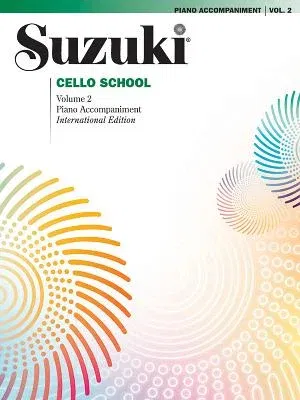Teach cello with the popular Suzuki Cello School. The Suzuki Method(R)
of Talent Education is based on Shinichi Suzuki's view that every child
is born with ability, and that people are the product of their
environment. According to Shinichi Suzuki, a world-renowned violinist
and teacher, the greatest joy an adult can know comes from developing a
child's potential so he/she can express all that is harmonious and best
in human beings. Students are taught using the mother-tongue" approach.
Each series of books for a particular instrument in the Suzuki Method is
considered a Suzuki music school, such as the Suzuki Cello School.
Suzuki lessons are generally given in a private studio setting with
additional group lessons. The student listens to the recordings and
works with their Suzuki cello teacher to develop their potential as a
musician and as a person.
This Suzuki piano accompaniment book aids in Suzuki cello lessons.
Titles: Long, Long Ago (Bayly) * May Time, Komm Lieber Mai (Longing for
Spring) from Sehnsucht nach dem Frühlinge, K. 96 (Mozart) * Minuet No.
1, Minuett III from Suite in G Minor for Klavier, BWV 822 (Bach) *
Minuet No. 3, Minuet in C, BWV Anh. II (Bach) * Chorus from Judas
Maccabaeus (Handel) * Hunters' Chorus from 3rd Act of the Opera Der
Freischutz (von Weber) * Musette in G, Gavotte II or the Musette from
English Suite III in G Minor for Klavier, BWV 808 (Bach) * March in G
(Bach) * Theme from Witches' Dance (Paganini) * Tonalization: The Moon
over the Ruined Castle (Taki) * The Two Grenadiers, Die Beiden
Grenadier, Op. 49, No. 1 for Voice and Piano (Schumann) * Gavotte
(Gossec) * Bourrée from Sonata in F Major for Oboe and Basso Continuo,
HHA IV/18, No. 8-EZ (Handel).
For a complete list of the most recent printings by AMPV number, go to
alfred.com/suzuki. This title is available in MakeMusic Cloud.
The International editions include an updated title page that designates
the book as the International Edition."

